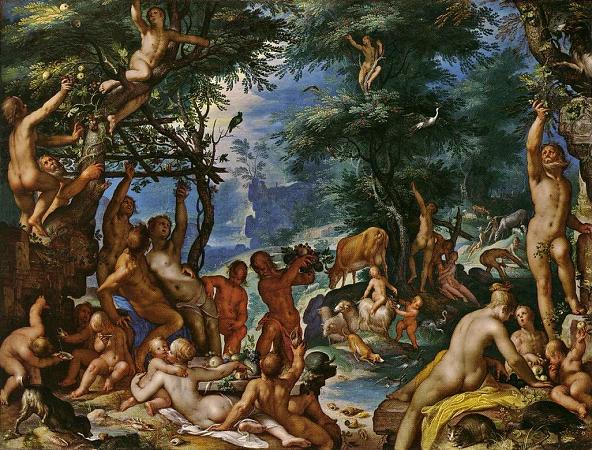Golden Age. The term Golden Age comes from Greek mythology, particularly the Works and Days of Hesiod, and is part of the description of temporal decline of the state of peoples through five Ages, Gold being the first and the one during which the Golden Race of humanity lived. Those living in the first Age were ruled by Kronos, after the end of the first age was the Silver, then the Bronze, after this the Heroic age, with the fifth and current age being Iron. By extension, Golden Age denotes a period of primordial peace, harmony, stability, and prosperity. During this age, peace and harmony prevailed in that people did not have to work to feed themselves for the earth provided food in abundance. They lived to a very old age with a youthful appearance, eventually dying peacefully, with spirits living on as guardians. Plato in Cratylus recounts the golden race of humans who came first. He clarifies that Hesiod did not mean literally made of gold, but good and noble. In classical Greek mythology, the Golden Age was presided over by the leading Titan Cronus. In some versions of the myth Astraea also ruled. She lived with men until the end of the Silver Age. But in the Bronze Age, when men became violent and greedy, she fled to the stars, where she appears as the constellation Virgo, holding the scales of Justice, or Libra. European pastoral literary tradition often depicted nymphs and shepherds as living a life of rustic innocence and peace, set in Arcadia, a region of Greece that was the abode and center of worship of their tutelary deity, goat-footed Pan, who dwelt among them. The earliest attested reference to the European myth of the Ages of Man 500 BCE-350 BCE appears in the late 6th century BCE works of the Greek poet Hesiod's Works and Days. Hesiod, a deteriorationist, identifies the Golden Age, the Silver Age, the Bronze Age, the Heroic Age, and the Iron Age. With the exception of the Heroic Age, each succeeding age was worse than the one that went before. Hesiod maintains that during the Golden Age, before the invention of the arts, the earth produced food in such abundance that there was no need for agriculture: lived like gods without sorrow of heart, remote and free from toil and grief: miserable age rested not on them; but with legs and arms never failing they made merry with feasting beyond the reach of all devils. When they died, it was as though they were overcome with sleep, and they had all good things; for the fruitful earth unforced bare them fruit abundantly and without stint. They dwelt in ease and peace. Plato in his Cratylus referred to an age of golden men and also at some length on Ages of Man from Hesiod's Works and Days. The Roman poet Ovid simplified the concept by reducing the number of Ages to four: Gold, Bronze, Silver, and Iron. Ovid's poetry was likely a prime source for the transmission of the myth of the Golden Age during the period when Western Europe had lost direct contact with Greek literature. In Hesiod's version, the Golden Age ended when the Titan Prometheus conferred on mankind the gift of fire and all the other arts. For this, Zeus punished Prometheus by chaining him to a rock in the Caucasus, where an eagle eternally ate at his liver. The gods sent the beautiful maiden Pandora to Prometheus's brother Epimetheus. The gods had entrusted Pandora with a box that she was forbidden to open; however, her uncontrollable curiosity got the better of her and she opened the box, thereby unleashing all manner of evil into the world. The Orphic school, a mystery cult that originated in Thrace and spread to Greece in the 5th century BCE, held similar beliefs about the early days of man, likewise denominating the ages with metals. In common with the many other mystery cults prevalent in the Graeco-Roman world, the world view of Orphism was cyclical. Initiation into its secret rites, together with ascetic practices, was supposed to guarantee the individual's soul eventual release from the grievous circle of mortality and also communion with god. Orphics sometimes identified the Golden Age with the era of the god Phanes, who was regent over the Olympus before Cronus. In classical mythology however, the Golden Age was associated with the reign of Saturn. In the 5th century BCE, the philosopher Empedocles, like Hesiod before him, emphasized the idea of primordial innocence and harmony in all of nature, including human society, from which he maintained there had been a steady deterioration until the present.
more...







